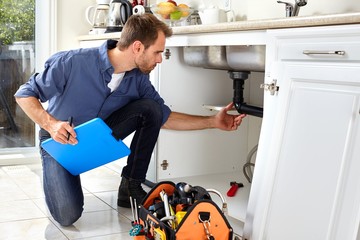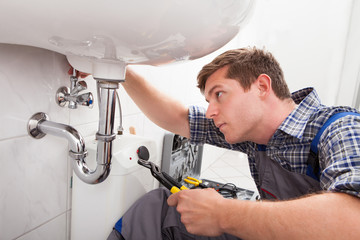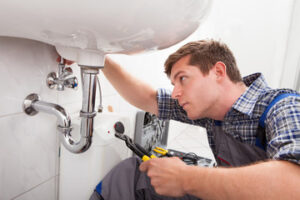Regarding plumbing, there are many differences between commercial and residential work. While a homeowner might call a plumber to clear a pesky drain, commercial plumbers are responsible for much larger systems in high-rise buildings and shopping centers.

Choosing the right commercial plumber can make all the difference in your building’s efficiency and safety. Contact Plumber Montgomery TX for professional help.
Many people associate plumbers with dirty work and have a negative view of this profession, but this is far from the truth. Being a plumber is actually an exciting and rewarding career that requires a large amount of training, intelligence, skills, and expertise. This is especially true for commercial plumbers, who have to deal with much more complicated systems and a larger volume of water. Commercial plumbing projects are typically more complex than residential ones, so it’s important to hire a commercial plumber who has the right experience.
There are a few things to look for in a good commercial plumber:
First, make sure they have the proper certifications. This will ensure that they are knowledgeable about the latest industry trends and techniques. It will also help them provide a higher quality service.
Next, ask about their prior experiences working on commercial projects. This will give you an idea of their level of expertise and whether they can handle your project. Also, ask about their safety procedures and if they are in compliance with any regulations related to your business.
Finally, make sure that they have the right equipment and tools for the job. This will help them complete the task quickly and efficiently without causing any disruptions to your workplace.
Choosing the right commercial plumber can be challenging, but it’s well worth the effort. The right plumber will ensure that your commercial plumbing projects are completed on time and within budget. They will also be able to provide you with emergency services whenever necessary.
While some plumbers can work on both residential and commercial projects, it’s generally best to specialize in one or the other. Commercial plumbers have to contend with a lot more rules and regulations than residential plumbers, so it’s essential that they have the right experience to handle these challenges. It’s also important for them to understand the unique needs of each type of building, so they can design and install the best plumbing solutions for each location. For example, a hospital has different requirements than a restaurant or a factory.
License
Commercial plumbing is a specialized field that involves the maintenance, installation, and repair of plumbing systems in industrial and commercial properties. This type of plumbing is necessary for businesses and organizations to run efficiently, comply with regulations, and offer a welcoming and sanitary atmosphere for staff members and visitors. This specialized field can be quite challenging, but can also offer lucrative financial rewards. In order to become a licensed commercial plumber, it is essential to undergo a rigorous apprenticeship program and pass a licensing exam.
Commercial plumbers must be licensed in order to work on plumbing systems for business facilities and larger commercial buildings. These types of properties may include strip malls, office buildings, warehouses, hospitals, and even large condominium complexes. Commercial plumbing is much more extensive and complicated than residential plumbing, which is why it requires a different set of skills and knowledge. Commercial plumbers must also be familiar with various codes and permits for working on commercial plumbing projects.
A licensed commercial plumber is required to have a high school diploma or equivalent and complete a trade school plumbing program or an apprenticeship. These programs typically last 4-5 years and combine classroom learning with on-the-job training. Once a plumber has completed an apprenticeship, they are eligible to take the journeyman plumbing exam.
The difference between residential and commercial plumbing is primarily the size of the space. In addition to the increased use of water, commercial spaces often have much higher ceilings and walls than residential properties. This means that commercial plumbing pipes have to be more robust and capable of handling greater water pressure.
Commercial plumbing also involves a greater risk of damage. While a broken pipe in a single-family home may not be a major issue, it could be disastrous for a busy restaurant or retail store. In addition to the increased usage of water, commercial spaces are usually more crowded with people than residential properties. This can put a strain on the plumbing system and lead to more frequent breakdowns. This requires more frequent maintenance and repair services from a licensed commercial plumber.
Insurance
Plumbing is a highly skilled profession and while there is no legal requirement for plumbers to have insurance, it is recommended. Having the right business insurance protects your company in case of an accident or a lawsuit. Typical small business policies include general liability, contractors’ errors and omissions, commercial auto, workers’ compensation and tools and equipment coverage. Next offers an easy online application that allows you to build a custom policy and get a quote by providing basic information about your business. The premium is based on several factors including your revenue, sales and the number of employees you have.
General liability insurance is a necessity and it typically covers third-party claims of bodily injury, property damage and personal and advertising injury. It’s also a good idea to consider a professional liability policy or an errors and omissions insurance for plumbers, which can cover your legal fees in the event of a mistake that results in damages or loss.
Workers’ compensation is a required coverage in most States and it typically helps pay for medical bills and lost wages for an employee who is injured or made sick while working at your business. It’s also important to have a commercial auto policy for the vehicles your business uses, as it protects you from liabilities arising from accidents that occur while you or an employee is driving to and from work.
Tools and equipment coverage is a must for plumbers, as it protects your valuable gear from theft or damage. This is especially important since you take your tools with you when traveling between jobs. It’s also worth considering a commercial umbrella policy, which is an additional layer of protection in the event of a catastrophic claim that exceeds your underlying policies. You can easily purchase insurance for your business by filling out an easy online application with Next and you can log in at any time to add additional insureds, share a certificate of insurance or file a claim. You can even get a free quote for your business with just a few details about your business.
Warranty
A reputable commercial plumber will offer a warranty for their work. This means that if the issue they fixed reappears within the warranty period, they will come back and fix it at no extra cost to you. This is a sign of confidence in their work and an assurance that you will get quality service.
The plumbing system in a commercial building is usually more complicated than in residential properties. For instance, a leak in one floor may affect several floors below it. Commercial plumbers are trained to handle these types of issues. They can also install, inspect and repair backflow prevention devices to prevent pollutants from contaminating the water supply.
When looking for a reputable commercial plumber, make sure to look for online reviews and recommendations from other business owners. This will help you find a plumber that has a proven track record of excellent work and customer satisfaction. In addition, you should inquire about pricing and transparency. A good commercial plumber will be willing to provide you with a detailed estimate for the work they will do.



 The water supply is a critical component of your home’s plumbing system. It brings freshwater in and takes wastewater out. Your water line in a typical home starts at a public main and ends in your meter. The meter then sends water to your faucets and toilets.
The water supply is a critical component of your home’s plumbing system. It brings freshwater in and takes wastewater out. Your water line in a typical home starts at a public main and ends in your meter. The meter then sends water to your faucets and toilets.
 There are a number of benefits to becoming a plumber. First of all, there is a high demand for qualified plumbers. Despite their high pay, plumbers risk contracting infections. Infections and other diseases can be transmitted through fecal matter or vomit. Furthermore, the sewage system is often contaminated, and it can cause plumbing issues. Hence, it is important to have the necessary training and certification.
There are a number of benefits to becoming a plumber. First of all, there is a high demand for qualified plumbers. Despite their high pay, plumbers risk contracting infections. Infections and other diseases can be transmitted through fecal matter or vomit. Furthermore, the sewage system is often contaminated, and it can cause plumbing issues. Hence, it is important to have the necessary training and certification.